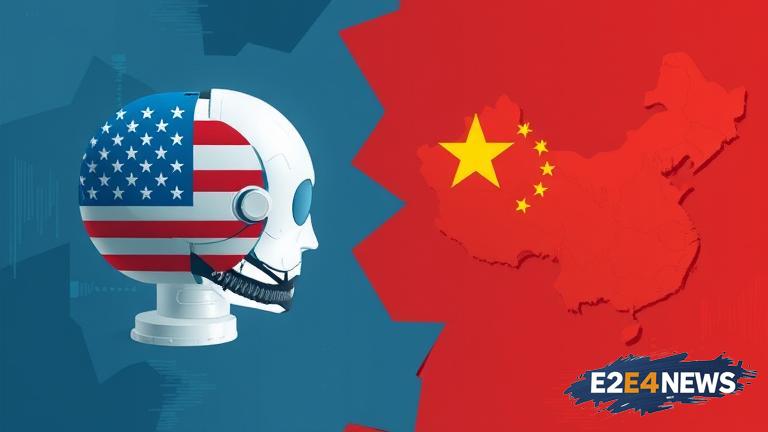The United States and China are engaged in a high-stakes competition to develop and deploy artificial intelligence (AI) technologies, with significant implications for national security, economic growth, and global governance. Both countries have developed comprehensive AI playbooks, outlining their strategies for AI research, development, and deployment. The US AI playbook emphasizes the importance of innovation, entrepreneurship, and public-private partnerships, while the Chinese AI playbook prioritizes state-led investment, research, and development. The US approach is characterized by a strong focus on basic research, with significant funding allocated to universities and research institutions. In contrast, China’s AI playbook is driven by a top-down approach, with the government playing a central role in guiding AI development and deployment. China’s AI strategy is also notable for its emphasis on applications, with a focus on developing AI solutions for real-world problems. The US AI playbook, on the other hand, prioritizes the development of AI technologies, such as machine learning and natural language processing. Both countries recognize the importance of AI talent, with the US seeking to attract and retain top AI researchers and China investing heavily in AI education and training programs. The US AI playbook also emphasizes the need for AI governance, with a focus on developing regulations and standards for AI development and deployment. China’s AI playbook, while acknowledging the importance of governance, prioritizes the development of AI technologies over regulatory frameworks. The implications of these competing AI playbooks are significant, with potential consequences for national security, economic growth, and global governance. The US and China are likely to continue to compete in the development and deployment of AI technologies, with significant investments in AI research and development. The US AI playbook is likely to prioritize the development of AI technologies, such as autonomous systems and biometrics, while China’s AI playbook will focus on developing AI solutions for real-world problems, such as healthcare and finance. The competition between the US and China will also have significant implications for global governance, with potential consequences for international cooperation and conflict. The development of AI technologies will also raise important questions about ethics, accountability, and transparency, with both countries seeking to develop frameworks for AI governance. The US AI playbook will prioritize the development of AI technologies, while China’s AI playbook will focus on developing AI solutions for real-world problems. The competition between the US and China will drive innovation and investment in AI research and development, with significant implications for national security, economic growth, and global governance. The US and China will need to navigate complex issues related to AI governance, including data protection, privacy, and cybersecurity. The development of AI technologies will also raise important questions about the future of work, with potential consequences for employment and economic growth. The US AI playbook will prioritize the development of AI technologies, while China’s AI playbook will focus on developing AI solutions for real-world problems. The competition between the US and China will drive innovation and investment in AI research and development, with significant implications for national security, economic growth, and global governance. The US and China will need to develop frameworks for AI governance, including regulations and standards for AI development and deployment. The development of AI technologies will also raise important questions about ethics, accountability, and transparency, with both countries seeking to develop frameworks for AI governance. The US AI playbook will prioritize the development of AI technologies, while China’s AI playbook will focus on developing AI solutions for real-world problems. The competition between the US and China will drive innovation and investment in AI research and development, with significant implications for national security, economic growth, and global governance.
